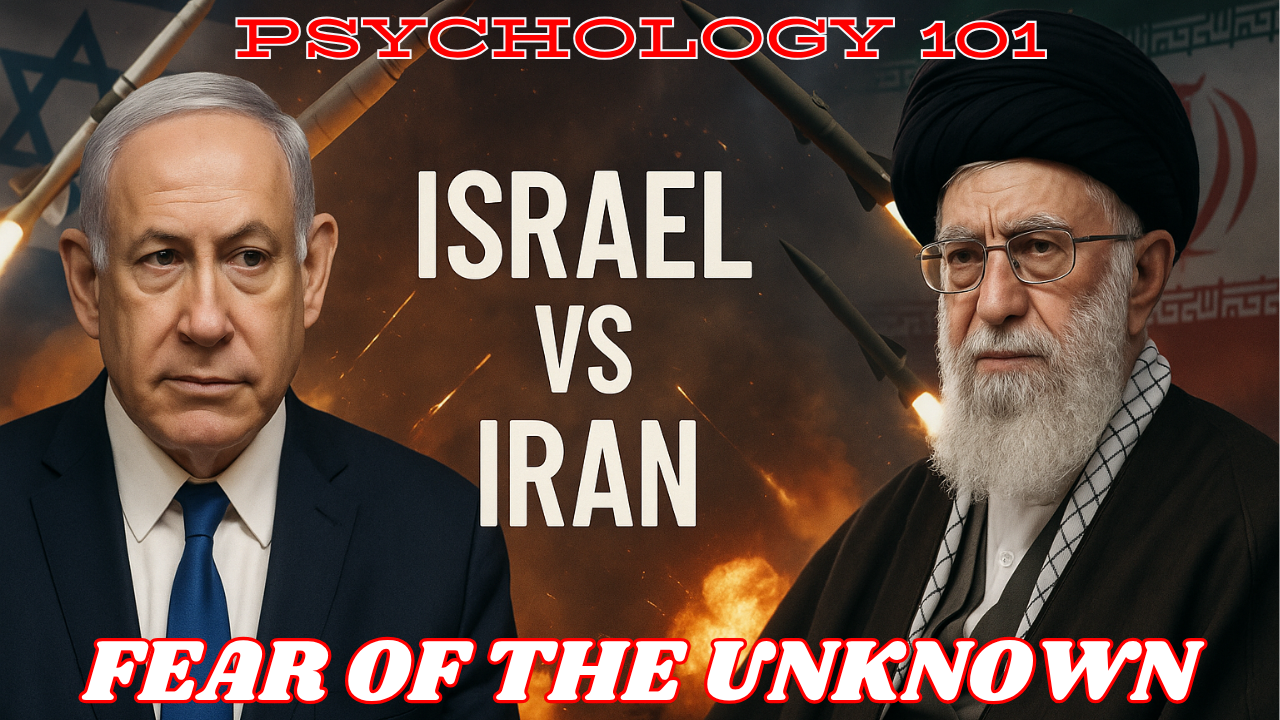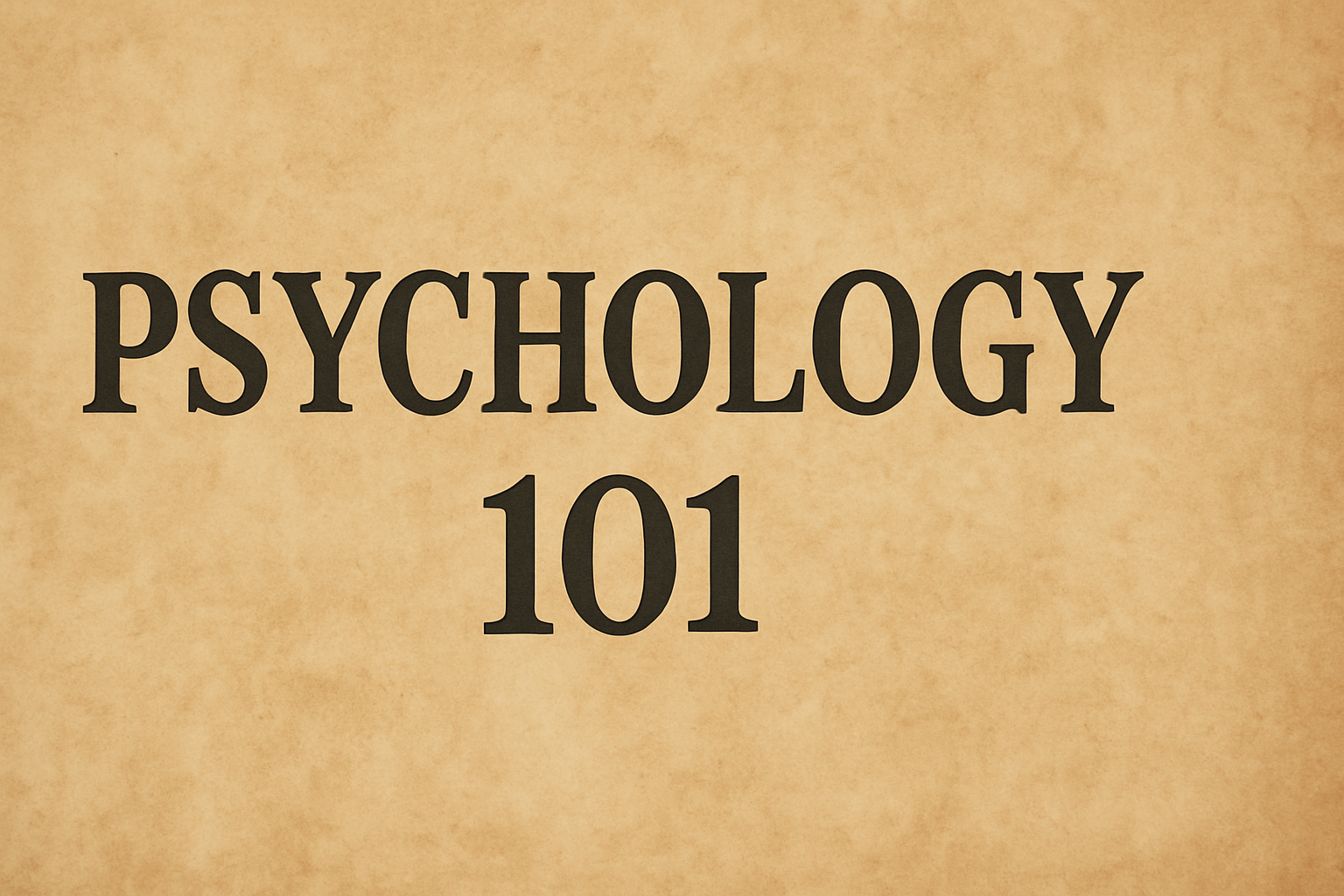3. Fear of the Unknown: The Main Psychological Factor Behind the Israel-Iran War

What is Fear of the Unknown? Fear of the unknown is the feeling we get when we face something unfamiliar — something we don’t understand, can’t predict, or can’t control. It’s the anxiety of uncertainty. It’s why people stay in unhappy jobs, avoid honest conversations, or mistrust people who are different. Not because they’re in danger — but because they don’t know what will happen if they step into the unknown. And the Human Mind would often rather stay in what’s familiar — even if it’s painful, hostile, and counterproductive— than risk stepping into something uncertain, even if it might be better.
Psychologically speaking, “fear of the unknown” is the chemical reaction we feel when we think about changing a job, spouse, nation, religion, situation, or career— that we can’t fully predict or control the outcome, since we are the one who's going to face the good or bad of our decision. And instead of asking questions, conducting research, or seeking clarity, we often default to staying in with the same job, spouse, nation, religion, situation, or career.
Why?
Because Fear of the Unknown is powerful. It has killed dreams, futures, self-actualization, and goals of billions of people throughout History.
Fear of the Unknown threatens our mental stability. It forces us to stay in our comfort zone (the Known). It pushes us to love our attachments until the breaking point— bankrupt or break us. It leads us to believe that our thoughts and beliefs are accurate and truthful, as that's what we know. It makes people cling harder to what is familiar, even if it’s flawed and unbearable.
“Better the devil you know than the angel you don’t,” they say — and that one sentence captures the heart of Fear of the Unknown's Factor.
This is why People Fear Change— Why married people fear divorcing— Why the rich fear bankruptcy— Why the poor fear richness— Why the Israeli Nation fears a nuclear-armed Iran—and Why some societies label others as dangerous before ever giving them the opportunity or chance.
Here is Why!
It’s safe and easier to reject what you don’t know or understand than to step into the discomfort of waiting to see or learn the outcome of your change.
Can we blame them?
But here’s the more profound truth:
Fear of the Unknown is not the enemy. It is the invitation to think critically.
An invitation to think wider: to ask questions, to conduct research, and to think beyond our limited worldview or surface level.
Psychology teaches us that maturity begins when curiosity replaces fear — when we start asking “Why do I feel threatened in the first place?”
Psychology is the Science in charge of researching and examining the Art of War. War is a phenomenon of Human Behavior, and Psychology plays a central role in explaining Why Humans engage in it— How they justify it— and What it does to Individuals and Societies.
It’s not just about weapons or International Politics — it’s about Human Bahavior and Mental Processes— FEAR OF THE UNKNOWN — RELIGIOUS BELIEF— and Psychological Scars: Trauma, Grief, and Intergenerational Cycles of Retaliation. Psychology also helps us to understand How Peace can emerge through Empathy, Perspective-taking, Healing, and Dialogue.
Is War Inevitable?
The belief that war is inevitable has existed for centuries, often rooted in the long history of economic, political, and religious wars and conflicts. But is war truly a fixed part of human nature, or is it a pattern we’ve learned and reinforced over time? In my humble opinion, when Diplomatic Dialogue and Negotiation fail, the strongest (fittest or smarter) prevail.

Humans Do Not Differ Significantly from the Way the Animal Kingdom Behaves
Cognitive Biases That Fuel War
Psychology helps explain why wars happen even when nobody truly wants them:
- Confirmation bias causes leaders to perceive threats even where none exist.
- Groupthink encourages people to conform to decisions that are ultimately destructive.
- Dehumanization allows individuals to commit violence without guilt.
- In-group/out-group bias turns political rivals into existential enemies.
These mental shortcuts can make war feel “natural,” even when it’s actually the result of distorted thinking and poor decision-making.
Culture, Not Just Biology
Some Societies are far more war-prone than others. This suggests war is not just biological — it’s also cultural, historical, and political. When conflict is glorified, normalized, or passed down as a part of one's identity, war becomes a self-fulfilling prophecy. On the other hand, when Peace is taught, modeled, and rewarded — as seen in post-conflict societies that value reconciliation — the cycle of violence can be broken.
I dare to say that incorporating Judaism, Christianity, Hinduism, and Buddhism in a nation can be a way to end wars since these religious ideologies promote Peace, Negotiation, Forgiveness, and Social Bonding (Love your neighbor as yourself). Can we say the same for the Muslim-Islam Religious Ideology?

☢️ Why Judeo-Christian Western Civilizations Fear Iran Having Nuclear Power
The fear of Iran acquiring nuclear weapons is not just a political or military issue — it’s deeply Psychological. For many in the West, especially in the U.S. and Israel, the idea of Iran as a nuclear-armed state taps into powerful Emotions, biases, and cultural narratives that go beyond strategy.
Here’s how Psychology helps explain this Fear:
1. Perception of Intent
Western nations don’t just fear what Iran can do — they fear what they believe Iran wants to do.
- Iran is often framed as an ideologically driven state, led by religious hardliners and guided by anti-Western rhetoric.
- This fuels intent-based fear — the idea that if Iran had nuclear power, it would be more likely to use it aggressively, unlike other nuclear states like Russia that are seen as “rational Christian nation" or “stable.”
This perception creates asymmetrical fear: Iran is not judged by what it has but by what the West assumes it might do with it. What happens if you're going to bed and you see a venomous snake on it? Simple, you kill it or take it away, so you can sleep safely and competently. It's called common sense.
What Human Fear— Human Kill.
2. Loss of Control and the Illusion of Safety
Western countries are accustomed to holding military and technological superiority. The idea of Iran reaching nuclear parity poses a threat to that.
- It creates a sense of Loss of Control, which triggers anxiety.
- There’s a status quo bias: nations tend to prefer keeping dangerous tools in the hands of the “known Jewish-Christian trusted nations.”
- A nuclear Iran represents a world where deterrence is no longer Western-led, and that’s deeply unsettling.
3. Group Psychology and In-Group Threats
Iran is psychologically seen as part of an out-group — culturally, religiously, and politically. While the superpowers like Russia, China, and India have Nuclear Power, they do not represent a global threat since their Ideology promotes Love and Compassion, not conquering the World by Force. The world trusts these Nations with Nuclear Mass Destruction Weapons for a reason.
- When an out-group gains power, people tend to fear it more than if the same "Lovely and Compassionate Power" were held— by an in-group— a Jewish-Catholic-Orthodox-Protestant Christian nation.
- This is part of social identity theory: threats from rival groups are processed as more emotionally urgent and dangerous.
A nuclear Iran becomes not just a security issue— but a symbolic threat to Western identity and dominance. This symbolic threat also pushes the Judeo-Christian Nations to get rid of the danger, so they can sleep safely and competently. Until the day Iran becomes strong enough to destroy the Judeo-Christian Western Nations.

Fear of the Unknown: The Main Psychological Factor behind the Israel-Iran Nuclear War
The most Powerful Psychological Force driving global tension — including the West’s Fear of Iran having Nuclear Power— is Fear of the Unknown. Human beings are wired to feel anxious or defensive when they encounter unfamiliar circumstances, people, ideas, or systems. Psychologists call this uncertainty aversion or xenophobia in its extreme forms. When applied to International Conflict, this means:
- We tend to trust nations that are Culturally Similar to us.
- We feel safer when others behave in Predictable, Familiar Ways.
- We feel threatened when faced with Different Languages, Belief Systems, or Political Structures we don’t fully understand.
How This Applies to Israel-Iran Nuclear War
Iran’s political system, religious leadership, and revolutionary rhetoric often seem opaque or ideologically foreign to Western observers, as Iran's Nebuchadnezzar Ideology implies the adoption of its Muslim Religious Ideology by force and mandatory. This creates Psychological Discomfort. The Fear isn’t always based on rational threat assessments — it’s often driven by Religious Differences.
The West’s comfort with countries like the UK, France, or even nuclear-armed China and India that isn’t just about alliances — it’s about shared cultural symbols, systems, and love-based values that feel familiar.
Iran, by contrast, is seen as a symbolic “other”: different in religion— anti-Israeli— and anti-Judeo-Christian Nations.
The Mistaken Assumption
It’s tempting — but dangerous — to assume that changing Iran’s identity (like turning Iran and the Middle East into Judaism, Hinduism, Buddhism, or Christianity would automatically reduce Global Fear or tension. Iran won't change their Religious Ideologies, and Westerners won't change theirs. It's just a waste of time—the weakest assumption ever, but tempting.
That assumption oversimplifies the Psychology behind international mistrust.
What actually reduces Fear is not Religious sameness but:
- Transparency
- Dialogue
- Mutual understanding
- Stable, predictable behavior
- Creating Laws and Circumstances that guarantee the safety of the Judeo-Christian Nations— already with Nuclear Power.
- Implementing Universal Constitutional Laws against forcing people to turn to Islam. The whole world does not have to bow down to Mecca and Allah.
Psychology reveals that familiarity breeds trust, not necessarily because of shared familiarity, but rather because of the Human Mind's Need for safety, cognitive certainty, and predictability.
The Western Fear of Iran is rooted in the Current Iranian Policies, Laws, Religion, and Ideologies. It’s not that one culture or belief is better than another— it’s that Humans Often Fear What They Perceive as a threat, or don't understand. Overcoming that Fear requires Education, Changes, Engagement, and Empathy, not War.
The real path to Peace isn't sharing the same religious—it's Establishing Policies and Laws that are compatible with—Love Your Neighbor as Yourself— Ideology. Becoming a Jew-Friendly Entity.

✅ Final Reflection
The only reason Judeo-Christian Nations, despite having Nuclear Power, are not completely taking control of resources like oil from their Muslim Nations is that the majority of Westerners adhere to the belief in "Love your neighbor as yourself," which stems from a Judeo-Christian Mindset.
It is important to evaluate the effectiveness of our Ideologies, Religions, and Mindsets. What if the opposite were true—meaning, Iran having Nuclear Power? Would the Judeo-Christian Nations be safe?
If diplomacy fails, one option remains: War. Preventing Iran from acquiring Nuclear Power is a matter of time. We are forced to work with Universal Constitutional Laws against forcing people to turn to Islam. Our U.S. President Donald Trump attempted to disarm Iran of Nuclear Power. However, according to unofficial sources, that "atrocity" only delays Iran by a couple of years before it can arm itself with Nuclear Power again.
Is the War Inevitable? Yes and No.
Ultimately, when Diplomatic Negotiations collapse, the Law of Nature reemerges— "the stronger (fittest or smarter) will survive". May the best prevail—I hope for the success of the Judeo-Christian Nations— ISRAEL!

